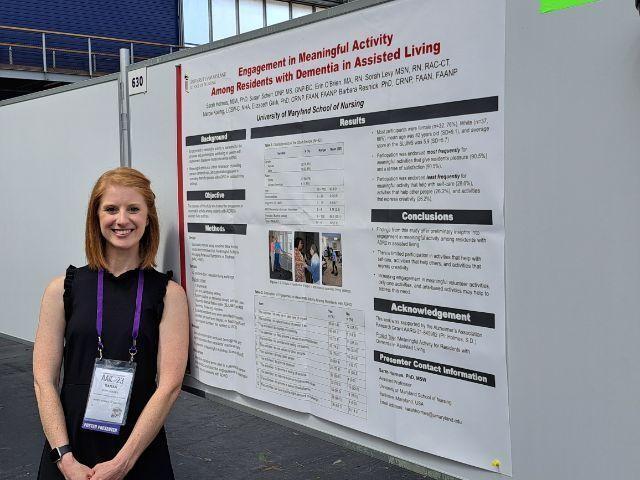The Meaning of Meaningful Activity Research
 Researcher:
Researcher:
Sarah Holmes, PhD, MSW
Assistant Professor
In 2021, Holmes was awarded a four-year $150,000 Alzheimer’s Association Research Grant as the principal investigator for the project “Meaningful Activity for Residents with Dementia in Assisted Living.” Barbara Resnick, PhD ’96, RN, CRNP, FAAN, FAANP, Distinguished University Professor, Sonya Ziporkin Gershowitz Chair in Gerontology, and associate dean for research; and Elizabeth Galik, PhD ’07, CRNP, FAAN, FAANP, professor and chair of the Department of Organizational Systems and Adult Health, serve as co-investigators.
Areas of Expertise:
Holmes’ research centers on improving the quality of life and care outcomes for residents in long-term care and people living with Alzheimer’s disease and related dementias (ADRD). Specifically, her work focuses on developing and testing interventions for older adults and people with ADRD to help improve their engagement in meaningful activity through adaptations to their physical, social, and care environments.
This has been fueled by her previous experiences, including her engagement in research as a student through Opening Minds through Art, an intergenerational arts-based intervention specifically designed for people with ADRD. “Witnessing the direct impact of this arts-based intervention on participants’ well-being and realizing that my career could contribute to improving evidence-based practices and programs for people with ADRD was a critical moment that ultimately led me to pursue a PhD and continue my research journey,” Holmes says.
The BIG Idea:
Findings from the Alzheimer’s Association Research Grant study will inform best care practices aimed at optimizing what is known as “meaningful activity,” activities tailored to the interests and preferences of people with ADRD that decrease behavioral symptoms of distress and improve their quality of life.
Holmes’ research investigates the interplay between individual and environmental factors (e.g., physical spaces, social relationships, interactions with staff) and has led to the development of a non-pharmacologic intervention to improve meaningful activity engagement for residents with ADRD in assisted living settings.
Holmes is testing the feasibility and preliminary efficacy of a “Meaningful Activities for Managing Behavioral Symptoms of Distress” intervention, also known as the MAC-4-BSD, that the team developed. Guided by the social-ecological framework and social cognitive theory, MAC-4-BSD involves a four-step approach:
- Assessment of assisted living physical environment and policies to facilitate meaningful activity
- Education of care staff about implementation of meaningful activity
- Assessment of resident preferences and goals for meaningful activity
- Mentoring and motivating staff and residents to facilitate engagement in meaningful activity.
The objective of the study is to determine if the MAC-4-BSD model reduces behavioral symptoms of distress by modifying the environment and empowering staff to facilitate and engage residents in meaningful activities.
One hundred residents with mild to moderate dementia will be recruited from four assisted living communities in Maryland. Outcomes will be evaluated at baseline, four, and 12 months. Findings from this study will lay the groundwork for a larger randomized controlled trial to test the effectiveness of MAC-4-BSD for reducing behavioral symptoms and improving quality of life for the growing number of residents with ADRD in assisted living communities.
Why does the research matter?
Approximately half of residents in nursing homes and residential long-term care settings currently have ADRD, many of whom exhibit behavioral symptoms of distress such as resistance to care or agitation. These behavioral symptoms may be triggered or exacerbated by the physical and social environment and can negatively affect residents’ quality of life, increase staff burden, and lead to inappropriate use of psychotropic medications.
One promising non-pharmacologic strategy for managing these behavioral symptoms is through participation in activities that are tailored to residents’ interests and preferences. Although engaging in meaningful activity is a critical dimension of person-centered care, it is not universally nor consistently provided in long-term care settings, especially for those with ADRD. Thus, there is an urgent need to develop and evaluate psychosocial interventions aimed at improving meaningful activity for residents with ADRD living in long-term care.
Who does the research matter to?
There have been numerous non-pharmacologic interventions implemented in long-term care settings over the years that focus on participation in structured group activities such as dance, music therapy, and recreation. However, there is conflicting evidence regarding the efficacy of these interventions in managing behavioral symptoms in people with ADRD, as these approaches do not consider the individual resident’s needs and preferences.
The research team recognizes that including the resident’s voice in care processes and decision-making is critical. In addition, direct care staff in long-term care settings play an essential role in encouraging residents to engage in meaningful activity, as they are the individuals who interact with residents the most and who understand their preferences for engagement. Holmes’ work focuses on including residents and empowering staff to facilitate and engage residents with ADRD in meaningful activity.
What are the clinical applications of the research?
Although residents with ADRD in long-term care settings have limited opportunities to engage in activities that they consider valuable and meaningful, evidence suggests that meaningful activity has positive implications for well-being, mental health, and cognitive and physical function. It promotes a sense of purpose through activities that re-engage the resident with previous personal interests or by making a contribution in their community, such as helping to deliver mail, set the table, or garden and water plants. These types of meaningful activities foster psychosocial well-being and social connectedness.
Through her research, Holmes hopes to provide a guide for implementation of evidence-based approaches to engage residents in meaningful activity that can be translated across long-term care communities for reducing behavioral symptoms (e.g., depression, agitation) and improving quality of life for people living with ADRD.
